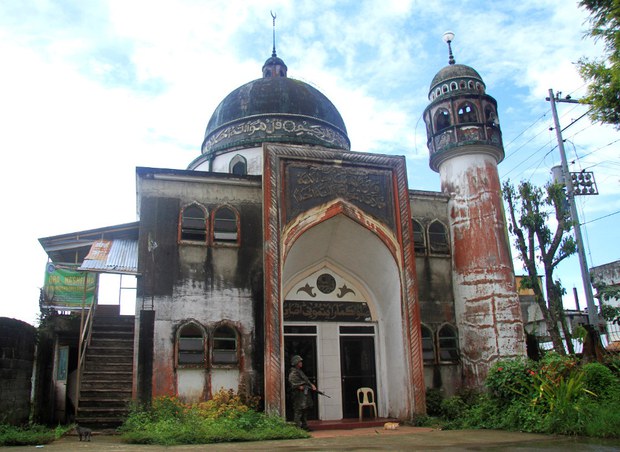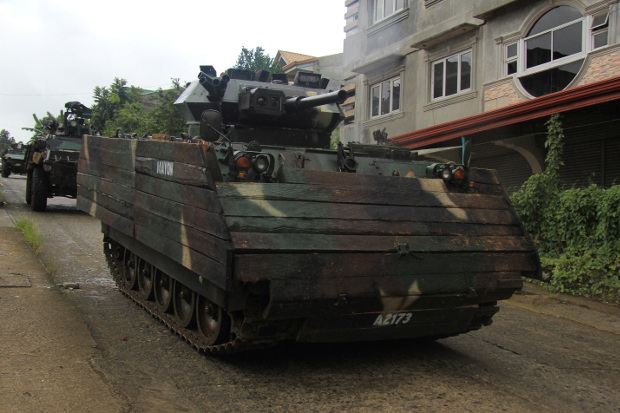Duterte Seeks Martial Law Extension in Southern Philippines
2017.07.18
Marawi, Philippines
 A Filipino soldier guards a mosque in Marawi, as government forces engage Islamic State-backed militants in other parts of the southern Philippine city, July 12, 2017.
A Filipino soldier guards a mosque in Marawi, as government forces engage Islamic State-backed militants in other parts of the southern Philippine city, July 12, 2017.
Philippine President Rodrigo Duterte on Tuesday formally asked Congress to extend martial law in the entire southern island of Mindanao throughout the rest of the year, his spokesman said.
In a letter to Senate President Aquilino Pimentel and House of Representatives Speaker Pantaleon Alvarez – who lead a congress dominated by his political allies – Duterte asked them to convene a special session this week to “deliberate and consider” the extension of Proclamation No. 216, presidential spokesman Ernesto Abella said.
Duterte used that proclamation to place Mindanao under martial law, giving the military special police powers – such as arresting suspects without warrants – to quell what he had described as a rebellion by Abu Sayyaf and Maute gunmen, who took over Marawi City on May 23.
“I have come to the conclusion that the existing rebellion in Mindanao … will not be quelled completely by 22nd July 2017, the last day of the 60-day period provided under section 18, Article 7 of the 1987 Constitution,” the president said in his letter to Congress.
“For this reason, and because public safety requires it, I call upon the Congress to extend until 31st of December 2017, or for such a period of time as the Congress may determine the proclamation of martial law and the suspension of the privilege of the writ of habeas corpus in the whole of Mindanao,” he said.
Duterte added he had the full backing of his defense secretary and martial law administrator, Delfin Lorenzana, along with the heads of the armed forces and the national police.
‘It addresses an abnormal situation’
Duterte’s request for the martial law extension is essentially an admission from him that the gunmen, who were backed by the Islamic State (IS) and an undetermined number of foreign fighters, would not be easily defeated as he had vowed earlier, observers said.
Deputy Minority Floor Leader Harry Roque, a former human rights lawyer, emphasized that while he backed Duterte’s martial law declaration, it “is never good for the country.”
“A declaration and a continuing declaration of martial law is an admission to the entire world community that there is rebellion or invasion in the Philippines and that the public safety requires its declaration,” Roque said.
“It addresses an abnormal situation,” he said. “Prolonged imposition is normalization of an abnormal situation.”
He said the extension “is never good for our international reputation.”
Opposition politicians, who are in the minority in both houses of Congress, said Duterte was clearly moving towards authoritarianism with the new order. They said it was also a tacit admission that the Marawi fighting was far from over, contrary to what Duterte himself said last week that it would only last a few more days.
“That’s just a whimsical misuse of power,” said Sen. Antonio Trillanes, one of Duterte’s staunchest critics. “Then again, I have already forewarned the public of Duterte’s authoritarian tendencies and this is another proof of it.”
He said an extension was “totally not justified,” considering that the military last week said only about 60 militants were fighting it out in Marawi, a predominantly Muslim city in the south that has been abandoned by its estimated 200,000 residents.

Armored personnel carriers equipped with cannons and machineguns enter the Marawi city war zone, July 17, 2017. [Richel V. Umel/BenarNews]
About 60 militants left
The fighting in Marawi broke out after troops and police had monitored the presence of Abu Sayyaf leader Isnilon Hapilon, the acknowledged local IS leader, and moved to arrest him.
But they ran into unexpected and strong back up from members of the local Maute group, who were reinforced by several fighters from Southeast Asia and the Middle East.
The gunmen engaged the government forces in battles, burned vital government installations and took dozens of hostages.
Amid the violence, Duterte was forced to accept help from longtime allies the United States and Australia, which provided overflights from surveillance aircraft.
The military said the gunmen went house-to-house, interrogating the occupants. Those who were found not to be Muslims were executed, including a group of civilians whom the military believed were summarily killed in the early days of the fighting and whose remains were found a few days ago.
On Monday, the military said 97 government troops, 45 civilians, 405 extremists, including several foreigners, had been killed in 56 days of fighting.
Military officials said the militants had been decimated, with just about 60 from several hundred when the fighting broke out, and that the gunmen remained well-entrenched in a small section of the city.
On Tuesday, presidential spokesman Abella said that the main objective of extending martial law was to allow a military solution to carry on with the campaign in the southern city “unhampered by deadlines, and to focus more on the liberation of Marawi and its rehabilitation and rebuilding.”
Duterte also had his own sources of information that prompted him to come to this conclusion, Abella said without divulging names.
Congress is to hold its special session on Saturday, a day before the current martial law expires.
Felipe Villamor in Manila contributed to this story.







